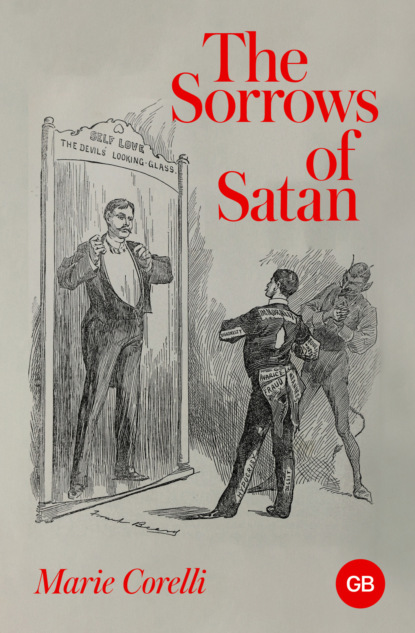По всем вопросам обращайтесь на: info@litportal.ru
(©) 2003-2025.
✖
The Sorrows of Satan
Настройки чтения
Размер шрифта
Высота строк
Поля
He looked at me with a flitting smile that darkened rather than lightened his face.
“True! very true! There is no compelling force in the whole Universe,—Man is the supreme and independent creature,—master of all he surveys and owning no other dominion save his personal desire. True—I forgot! Let us avoid theology, please, and psychology also,—let us talk about the only subject that has any sense or interest in it—namely, Money. I perceive your present plans are definite,—you wish to publish a book that shall create a stir and make you famous. It seems a modest enough campaign! Have you no wider ambitions? There are several ways, you know, of getting talked about. Shall I enumerate them for your consideration?”
I laughed. “If you like!”
“Well, in the first place I should suggest your getting yourself properly paragraphed. It must be known to the press that you are an exceedingly rich man. There is an Agency for the circulation of paragraphs,—I daresay they’ll do it sufficiently well for about ten or twenty guineas.”
I opened my eyes a little at this.
“Oh, is that the way these things are done?”
“My dear fellow, how else should they be done?” he demanded somewhat impatiently—“Do you think anything in the world is done without money? Are the poor, hard-working journalists your brothers or your bosom friends that they should lift you into public notice without getting something for their trouble? If you do not manage them properly in this way, they’ll abuse you quite heartily and free of cost,—that I can promise you! I know a ‘literary agent,’ a very worthy man too, who for a hundred guineas down, will so ply the paragraph wheel that in a few weeks it shall seem to the outside public that Geoffrey Tempest, the millionaire, is the only person worth talking about, and the one desirable creature whom to shake hands with is next in honour to meeting Royalty itself.”
“Secure him!” I said indolently—“And pay him two hundred guineas! So shall all the world hear of me!”
“When you have been paragraphed thoroughly,” went on Rimânez—“the next move will be a dash into what is called ‘swagger’ society. This must be done cautiously and by degrees. You must be presented at the first Levée of the season, and later on, I will get you an invitation to some great lady’s house, where you will meet the Prince of Wales privately at dinner. If you can oblige or please His Royal Highness in any way so much the better for you,—he is at least the most popular royalty in Europe, so it should not be difficult to you to make yourself agreeable. Following upon this event, you must purchase a fine country seat, and have that fact ‘paragraphed’—then you can rest and look round,—Society will have taken you up, and you will find yourself in the swim!”
I laughed heartily,—well entertained by his fluent discourse.
“I should not,” he resumed—“propose your putting yourself to the trouble of getting into Parliament. That is no longer necessary to the career of a gentleman. But I should strongly recommend your winning the Derby.”
“I daresay you would!” I answered mirthfully—“It’s an admirable suggestion,—but not very easy to follow!”
“If you wish to win the Derby,” he rejoined quietly—“you shall win it. I’ll guarantee both horse and jockey!”
Something in his decisive tone impressed me, and I leaned forward to study his features more closely.
“Are you a worker of miracles?” I asked him jestingly—“Do you mean it?”
“Try me!” he responded—“Shall I enter a horse for you?”
“You can’t; it’s too late,” I said. “You would need to be the devil himself to do it. Besides I don’t care about racing.”
“You will have to amend your taste then,”—he replied—“That is, if you want to make yourself agreeable to the English aristocracy, for they are interested in little else. No really great lady is without her betting book, though she may be deficient in her knowledge of spelling. You may make the biggest literary furore of the season, and that will count as nothing among ‘swagger’ people, but if you win the Derby you will be a really famous man. Personally speaking I have a great deal to do with racing,—in fact I am devoted to it. I am always present at every great race,—I never miss one; I always bet, and I never lose! And now let me proceed with your social plan of action. After winning the Derby you will enter for a yacht race at Cowes, and allow the Prince of Wales to beat you just narrowly. Then you will give a grand dinner, arranged by a perfect chef,—and you will entertain His Royal Highness to the strains of ‘Britannia rules the waves,’ which will serve as a pretty compliment. You will allude to the same well-worn song in a graceful speech,—and the probable result of all this will be one, or perhaps two Royal invitations. So far, so good. With the heats of summer you will go to Homburg to drink the waters there whether you require them or not,—and in the autumn you will assemble a shooting-party at the country seat before-mentioned which you will have purchased, and invite Royalty to join you in killing the poor little partridges. Then your name in society may be considered as made, and you can marry whatever fair lady happens to be in the market!”
“Thanks!—much obliged!” and I gave way to hearty laughter—“Upon my word Lucio, your programme is perfect! It lacks nothing!”
“It is the orthodox round of social success,” said Lucio with admirable gravity—“Intellect and originality have nothing whatever to do with it,—only money is needed to perform it all.”
“You forget my book”—I interposed—“I know there is some intellect in that, and some originality too. Surely that will give me an extra lift up the heights of fashionable light and leading.”
“I doubt it!” he answered—“I very much doubt it. It will be received with a certain amount of favour of course, as a production of a rich man amusing himself with literature as a sort of whim. But, as I told you before, genius seldom develops itself under the influence of wealth. Then again ‘swagger’ folks can never get it out of their fuddled heads that Literature belongs to Grub Street. Great poets, great philosophers, great romancists are always vaguely alluded to by ‘swagger’ society as ‘those sort of people.’ Those sort of people are so ‘interesting’ say the blue-blooded noodles deprecatingly, excusing themselves as it were for knowing any members of the class literary. You can fancy a ‘swagger’ lady of Elizabeth’s time asking a friend—‘O do you mind, my dear, if I bring one Master William Shakespeare to see you? He writes plays, and does something or other at the Globe theatre,—in fact I’m afraid he acts a little—he’s not very well off poor man,—but these sort of people are always so amusing!’ Now you, my dear Tempest, are not a Shakespeare, but your millions will give you a better chance than he ever had in his life-time, as you will not have to sue for patronage, or practise a reverence for ‘my lord’ or ‘my lady,’—these exalted personages will be only too delighted to borrow money of you if you will lend it.”
“I shall not lend,”—I said.
“Nor give?”
“Nor give.”
His keen eyes flashed approval.
“I am very glad,” he observed, “that you are determined not to ‘go about doing good’ as the canting humbugs say, with your money. You are wise. Spend on yourself,—because your very act of spending cannot but benefit others through various channels. Now I pursue a different course. I always help charities, and put my name on subscription-lists,—and I never fail to assist a certain portion of clergy.”
“I rather wonder at that—” I remarked—“Especially as you tell me you are not a Christian.”
“Yes,—it does seem strange,—doesn’t it?”—he said with an extraordinary accent of what might be termed apologetic derision—“But perhaps you don’t look at it in the proper light. Many of the clergy are doing their utmost best to destroy religion,—by cant, by hypocrisy, by sensuality, by shams of every description,—and when they seek my help in this noble work, I give it,—freely!”
I laughed “You must have your joke evidently”—I said, throwing the end of my finished cigar into the fire—“And I see you are fond of satirizing your own good actions. Hullo, what’s this?”
For at that moment Amiel entered, bearing a telegram for me on a silver salver. I opened it,—it was from my friend the publisher, and ran as follows—
“Accept book with pleasure. Send manuscript immediately.”
I showed this to Rimânez with a kind of triumph. He smiled.
“Of course! what else did you expect? Only the man should have worded his telegram differently, for I do not suppose he would accept the book with pleasure if he had to lay out his own cash upon it. ‘Accept money for publishing book with pleasure’ should have been the true message of the wire. Well, what are you going to do?”
“I shall see about this at once”—I answered, feeling a thrill of satisfaction that at last the time of vengeance on certain of my enemies was approaching—“The book must be hurried through the press as quickly as possible,—and I shall take a particular pleasure in personally attending to all the details concerning it. For the rest of my plans,—”
“Leave them to me!” said Rimânez laying his finely shaped white hand with a masterful pressure on my shoulder; “Leave them to me!—and be sure that before very long I shall have set you aloft like the bear who has successfully reached the bun on the top of a greased pole,—a spectacle for the envy of men, and the wonder of angels!”
VII
The next three or four weeks flew by in a whirl of excitement, and by the time they were ended I found it hard to recognize myself in the indolent, listless, extravagant man of fashion I had so suddenly become. Sometimes at stray and solitary moments the past turned back upon me like a revolving picture in a glass with a flash of unwelcome recollection, and I saw myself worn and hungry, and shabbily clothed, bending over my writing in my dreary lodging, wretched, yet amid all my wretchedness receiving curious comfort from my own thoughts which created beauty out of penury, and love out of loneliness. This creative faculty was now dormant in me,—I did very little, and thought less. But I felt certain that this intellectual apathy was but a passing phase,—a mental holiday and desirable cessation from brain-work to which I was deservedly entitled after all my sufferings at the hands of poverty and disappointment. My book was nearly through the press,—and perhaps the chiefest pleasure of any I now enjoyed was the correction of the proofs as they passed under my supervision. Yet even this, the satisfaction of authorship, had its drawback,—and my particular grievance was somewhat singular. I read my own work with gratification of course, for I was not behind my contemporaries in thinking well of myself in all I did,—but my complacent literary egoism was mixed with a good deal of disagreeable astonishment and incredulity, because my work, written with enthusiasm and feeling, propounded sentiments and inculcated theories which I personally did not believe in. Now, how had this happened, I asked myself? Why had I thus invited the public to accept me at a false valuation? I paused to consider,—and I found the suggestion puzzling. How came I to write the book at all, seeing that it was utterly unlike me as I now knew myself? My pen, consciously or unconsciously, had written down things which my reasoning faculties entirely repudiated,—such as belief in a God,—trust in the eternal possibilities of man’s diviner progress,—I credited neither of these doctrines. When I imagined such transcendental and foolish dreams I was poor,—starving,—and without a friend in the world;—remembering all this, I promptly set down my so-called ‘inspiration’ to the action of an ill-nourished brain. Yet there was something subtle in the teaching of the story, and one afternoon when I was revising some of the last proof sheets I caught myself thinking that the book was nobler than its writer. This idea smote me with a sudden pang,—I pushed my papers aside, and walking to the window, looked out. It was raining hard, and the streets were black with mud and slush,—the foot-passengers were drenched and miserable,—the whole prospect was dreary, and the fact that I was a rich man did not in the least lift from my mind the depression that had stolen on me unawares. I was quite alone, for I had my own suite of rooms now in the hotel, not far from those occupied by Prince Rimânez; I also had my own servant, a respectable, good sort of fellow whom I rather liked because he shared to the full the instinctive aversion I felt for the prince’s man, Amiel. Then I had my own carriage and horses with attendant coachman and groom,—so that the prince and I, though the most intimate friends in the world, were able to avoid that ‘familiarity which breeds contempt’ by keeping up our own separate establishments. On this particular afternoon I was in a more miserable humour than ever my poverty had brought upon me, yet from a strictly reasonable point of view I had nothing to be miserable about. I was in full possession of my fortune,—I enjoyed excellent health, and I had everything I wanted, with the added consciousness that if my wants increased I could gratify them easily. The ‘paragraph wheel’ under Lucio’s management had been worked with such good effect that I had seen myself mentioned in almost every paper in London and the provinces as the ‘famous millionaire,’—and for the benefit of the public, who are sadly uninstructed on these matters, I may here state as a very plain unvarnished truth, that for forty pounds[1 - A fact.],a well-known ‘agency’ will guarantee the insertion of any paragraph, provided it is not libellous, in no less than four hundred newspapers. The art of ‘booming’ is thus easily explained, and level-headed people will be able to comprehend why it is that a few names of authors are constantly mentioned in the press, while others, perhaps more deserving, remain ignored. Merit counts as nothing in such circumstances,—money wins the day. And the persistent paragraphing of my name, together with a description of my personal appearance and my ‘marvellous literary gifts,’ combined with a deferential and almost awe-struck allusion to the ‘millions’ which made me so interesting—(the paragraph was written out by Lucio and handed for circulation to the ‘agency’ aforesaid with ‘money down’)—all this I say brought upon me two inflictions,—first, any amount of invitations to social and artistic functions,—and secondly, a continuous stream of begging-letters. I was compelled to employ a secretary, who occupied a room near my suite, and who was kept hard at work all day. Needless to say I refused all appeals for money;—no one had helped me in my distress, with the exception of my old chum ‘Boffles,’—no one save he had given me even so much as a word of sympathy,—I was resolved now to be as hard and as merciless as I had found my contemporaries. I had a certain grim pleasure in reading letters from two or three literary men, asking for work ‘as secretary or companion,’ or failing that, for the loan of a little cash to ‘tide over present difficulties.’ One of these applicants was a journalist on the staff of a well-known paper who had promised to find me work, and who instead of doing so, had, as I afterwards learned, strongly dissuaded his editor from giving me any employment. He never imagined that Tempest the millionaire, and Tempest the literary hack, were one and the same person,—so little do the majority think that wealth can ever fall to the lot of authors! I wrote to him myself however and told him what I deemed it well he should know, adding my sarcastic thanks for his friendly assistance to me in time of need,—and herein I tasted something of the sharp delight of vengeance. I never heard from him again, and I am pretty sure my letter gave him material not only for astonishment but meditation.
Yet with all the advantages over both friends and enemies which I now possessed I could not honestly say I was happy. I knew I could have every possible enjoyment and amusement the world had to offer,—I knew I was one of the most envied among men, and yet,—as I stood looking out of the window at the persistently falling rain, I was conscious of a bitterness rather than a sweetness in the full cup of fortune. Many things that I had imagined would give me intense satisfaction had fallen curiously flat. For example, I had flooded the press with the most carefully worded and prominent advertisements of my forthcoming book, and when I was poor I had pictured to myself how I should revel in doing this,—now that it was done I cared nothing at all about it. I was simply weary of the sight of my own advertised name. I certainly did look forward with very genuine feeling and expectation to the publication of my work when that should be an accomplished fact,—but to-day even that idea had lost some of its attractiveness owing to this new and unpleasant impression on my mind that the contents of that book were as utterly the reverse of my own true thoughts as they could well be. A fog began to darken down over the streets in company with the rain,—and disgusted with the weather and with myself, I turned away from the window and settled into an arm-chair by the fire, poking the coal till it blazed, and wondering what I should do to rid my mind of the gloom that threatened to envelop it in as thick a canopy as that of the London fog. A tap came at the door, and in answer to my somewhat irritable “Come in!” Rimânez entered.
“What, all in the dark Tempest!” he exclaimed cheerfully—“Why don’t you light up?”
“The fire’s enough,”—I answered crossly—“Enough at any rate to think by.”
“And have you been thinking?” he inquired laughing—“Don’t do it. It’s a bad habit. No one thinks now-a-days,—people can’t stand it—their heads are too frail. Once begin to think and down go the foundations of society,—besides thinking is always dull work.”
“I have found it so,” I said gloomily—“Lucio, there is something wrong about me somewhere.”
His eyes flashed keen, half-amused inquiry into mine.
“Wrong? Oh no, surely not! What can there be wrong about you, Tempest? Are you not one of the richest men living?”
I let the satire pass.
“Listen, my friend,” I said earnestly—“You know I have been busy for the last fortnight correcting the proofs of my book for the press,—do you not?”
He nodded with a smiling air.
“Well I have arrived almost at the end of my work and I have come to the conclusion that the book is not Me,—it is not a reflex of my feelings at all,—and I cannot understand how I came to write it.”
“You find it stupid perhaps?” said Lucio sympathetically.

















